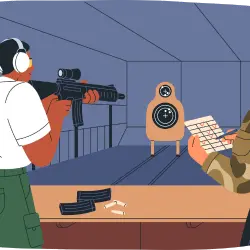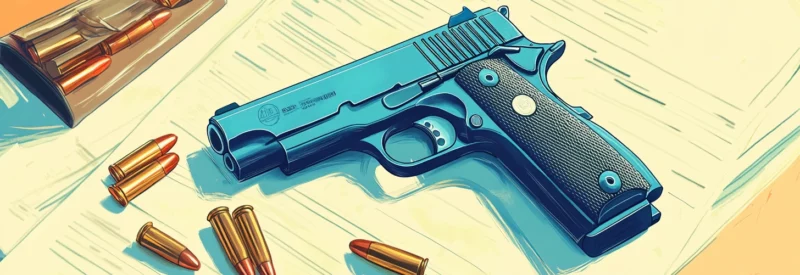TABLE OF CONTENTS
Business owners are rushing to sell guns online as the market shows a strong uptick in guns and firearm accessories. However, learning how to sell guns is a tricky business. Whether it’s due to the current political climate, lockdowns, or other factors, guns are in higher demand than ever. But that doesn’t necessarily mean that starting a firearms business is an easy industry to jump into and make a profit. Selling firearms comes with regulation and bias in business proceedings. This applies to businesses that sell guns online and via physical storefronts.
If you are interested in taking your passion to the next level and starting a business, whether for selling guns or any business in general, read on for tips to help you succeed.
Getting Started: How to Sell Guns
Starting a business selling guns is proving to be quite lucrative. It is important to note each state has different laws regarding firearms. Therefore, it’s imperative that you follow all guidelines and laws in place to ensure that your business is set up properly. Doing this protects you, your business, and your customers.
Why Now is the Time to Start a Business Selling Firearms

With almost half of households in the US owning a gun, gun ownership is not only widespread but also contributes to over 60 Billion dollars of activity in the economic market. With demand continuing to increase, now is the perfect time to start a business selling firearms.
Americans have long been accustomed to enjoying the freedom to keep and bear arms according to the Second Amendment of the Constitution. Because of this right, owning a gun is quite popular.
Firearm regulation in the United States is still quite relaxed compared to other nations. Because of this, it’s no surprise that starting a firearms business is becoming more popular. Selling guns doesn’t have to be a hassle. In the next section, we will cover how you can get started.
The firearm industry is expansive online
Today, at least 43% of all US households own at least one firearm. With such a massive market, the prevalence of eCommerce stores has also risen. Having the ability to generate income without a brick-and-mortar location is a great option for selling gun accessories. Selling guns online typically has a higher profit margin and allows you to configure your business in a more personalized way. The end result may even be to adopt the practice of drop shipping so that you don’t have to store and distribute inventory. Likewise, even a subscription option for your dedicated clients can be a worthy outlet to explore. eCommerce stores are extremely appealing for beginning and growing businesses in the gun accessories market.
How to Sell Guns in 5 Steps
Step 1: Register the Business
Anyone in the business of regularly selling guns will need to decide on a name encompassing their vision and brand identity. Once you have chosen what to call your entity, register your business with your state. Additionally, if you plan to sell firearms online, you will need to purchase the appropriate online domain.
Step 2: Decide on a business structure
After registering the name, it is now time to choose a business structure. Do you want to be an LLC, S-Corporation, or C-Corporation? Review the various tax benefits and legal implications of each when starting a firearms business in the manner best suited to you.
Step 3: Create a business plan
Decide how you will begin selling guns and firearm accessories. This is an essential step in the development of a strong model for success. Consider your finances and any financial planning or budgeting before you settle on how to run your business.
Take these questions into consideration while creating your business plan. Will you manufacture or resell? Who will you source the gun from, and how? Where will you ship, and how fast? How will customers be able to purchase your firearms? Brainstorm these ideas now so that when you’re ready to begin, you have a solid plan.
Step 4: Follow your state’s licensing requirements
Only individuals who sell guns once in a blue moon are exempt from obtaining a license to sell them. The vast majority of firearm sales require a Federal Firearms License. In addition, selling firearms across state lines most often requires a procedure called an FFL transfer. Research your local and state legislature to learn about what laws are in place and what licenses you need to sell firearms in your area.
Step 5: Open a retail store or online shop
The best way to sell firearms is by offering them in a store setting, whether that’s a brick-and-mortar location or online. When learning about how to sell guns, the traditional method has been to acquire a space to sell these items. Customers can visit the business and see for themselves how the equipment looks and feels before making a purchase.
The advent of online retail shops is becoming more popular as consumers look for more convenient ways to make their purchases. For business owners, to be able to sell guns online means less overhead and more profits – but only when done right. All in all, think about how you will best be able to reach your customers and how they can buy from you most conveniently.
Tips When Selling Firearms
Research local legislature
The Federal Gun Control Act (GCA) requires anyone in the business of dealing with firearms (online or in-person at trade shows, for example) to be licensed by the Bureau of Alcohol, Tobacco, Firearms, and Explosives (ATF). Without this license, you could face up to five years in prison or a $250,000 fine.
Some states have stricter laws than others in regards to the sale of firearms, so make sure to check with your state agencies prior to going into business.
Get to know your local clientele
Perform a target market analysis to gather sales data and hone in on your target audience. This will help you provide value and increase your clientele. Are your customers mostly law enforcement agents, hunters, collectors, or novel beginners? By analyzing your niche clientele’s wants and interests, you can offer products that appeal directly to them. It’s easier to sell guns to an audience that is actively looking to do just that.
Consider taking things online – if you aren’t already
eCommerce websites are exploding in popularity. Firearms consumers appreciate the convenience of online shopping, the large inventory of products available online, the ability to read reviews and easy product comparisons. With the increased use of online shopping due to COVID and social demand, convenience should be a top priority. Whether you plan to sell ammunition online or strictly firearms, increase sales by selling your products on the Internet.
Implement security protocols for online traffic
Adding an SSL or TSL certificate will ensure that all of the traffic you see when selling guns online is encrypted and secure for your shoppers. Don’t allow fraudsters to take sensitive information from your gun eCommerce store. It only takes one security breach to hurt your business, so you must take the necessary precautions.
Don’t overlook marketing
It’s important to connect with your community to reach your audience. In today’s world, social media is essential to accomplishing this. Stay top of mind with engaging posts showing the latest products, educating your clients on the latest regulations and sales, and more. This is a great way to appeal to your audience online and increase traffic to your website.
In addition to social media, SEO (search engine optimization) is a powerful tool to bring your website to the top of search engines so customers can easily find you.
Find a reliable payment processor
Learning how to sell a gun is a lot easier than setting up the processing for actually making the sale. Being in a high-risk industry means that you will have limited choices when it comes to credit card processing services, but finding a merchant account is a must. It is a powerful tool to ensure that online and in-store transactions are run securely and helps reduce some of the risks associated with the high-risk industry, such as:

- Legal liability: Banks don’t like to involve themselves in industries that require heavy amounts of licensing and verification. Because legal disputes can easily occur, most industries regulated by the ATF are labeled as high-risk.
- Reputational risk: For better or for worse, the firearms industry has a negative media reputation that makes doing business more difficult than it should be. Many financial institutions are not interested in associating with an industry that is perceived as unreliable or dangerous.
- Common fraud: The regulations that apply to FFL dealers are fairly simple, but that doesn’t always stop illegal transactions from happening. Whether the fraud occurs on the side of the dealer or the customer, most banks are not willing to take the risk.
Get a firearms merchant account to ensure your business can accept payments in any format and is protected along the way.
Take the First Step to Sell Guns Online or In-Store
Selling firearms doesn’t have to be a headache. As long as you take the necessary steps to ensure you are legally sound by abiding by all local, state, and federal legislation, you can avoid a lot of stress. Owning a business that sells guns and firearm accessories, whether online or through a physical store, is an exciting opportunity as gun ownership continues to increase. Take the first step towards achieving this goal today!






